
A Brief History of Public Shelters
A Brief History of Public Shelters
The economic hardship in Romania under communism meant a blossoming of illicit and illegal ways of making money – a secondary and seedy ‘black market’. One of the particularly upsetting and gruesome trades to emerge from this underground economy were public dog shelters. These ‘shelters’ were essentially abattoirs, within which dogs were brutally murdered, skinned, and dismembered for organic materials sellable within the fashion and cosmetics industries. This barbaric and disgusting practice of butchering dogs for their skin had kept the stray population in check. The collapse of the dictatorship meant a freer press, this, the emergence of the internet, Romania’s intent to join the EU and appear civilized in the eyes of the west meant a welcome end to this grisly practice.
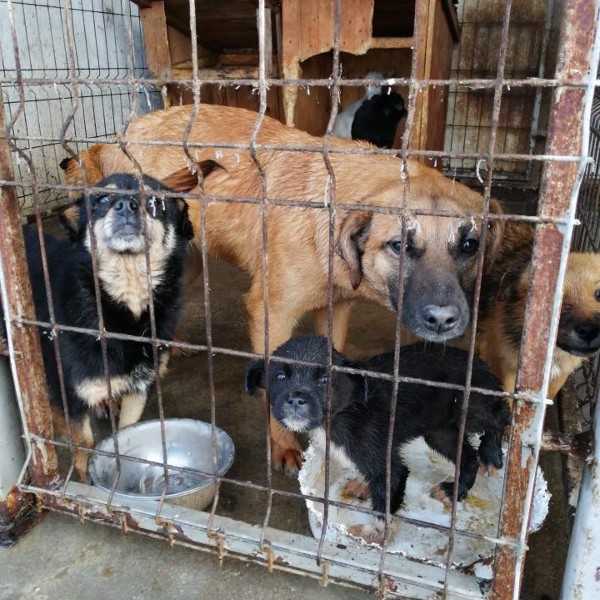
Public Shelters Now
However, in the 3 decades since, the homeless dog population has skyrocketed. This boom in the stray dog population has ironically created a new market for public shelters that are financed from public funds, money that comes from the Romanian government who pay them according to how many dogs they can ‘remove’ from the streets.
They do not care about the welfare of animals, they euthanize at any opportunity and there are no regular/unannounced inspections to hold them to account. The management does not care if the shelter has become a cesspit within which starvation, disease, and violence abound. It is a common and tragic occurrence that previously healthy dogs are brought into shelters and soon die from easily preventable illnesses and wounds, arising from the awful conditions.
How Public Shelters Kill and Traumatise Dogs
Physically:
● Poor hygiene leads to the mass spread of infectious diseases which kill puppies and weaker dogs;
● Dogs are fighting – for food, lack of space, or even boredom and some die of untreated wounds;
● Dogs are eating each other to survive;
● Dogs harm themselves in the fencing trying to escape;
● In many cases, dogs are abused by dog catchers.
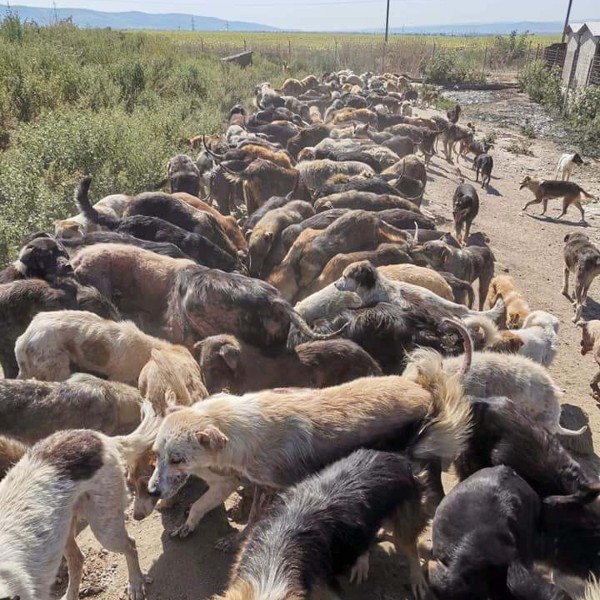
Mentally:
● Whilst physical wounds can eventually heal, the trauma that a dog suffers in a public shelter haunts them for life;
● The overcrowding and noise terrifies sensitive dogs (when a metal door is closing or a sudden move);
● The constant terror of being abused by staff or attacked by larger, aggressive dogs;
● Weaker dogs are not allowed to eat by other dogs and die of starvation;
● Some dogs stand like statues – cowering in fear in a corner – desperate not to draw attention from aggressive Alpha dogs;
● For some dogs losing the freedom they had on the streets is enough to drive them mad and change their behavior forever;
● Some fatally injury themselves trying to escape and or hurt their mouth trying to bite the metal fencing to find a way to get out;
● We all know that dogs have a very sensitive nose, it is inhumane to keep them in such squalid conditions surrounded by filth.
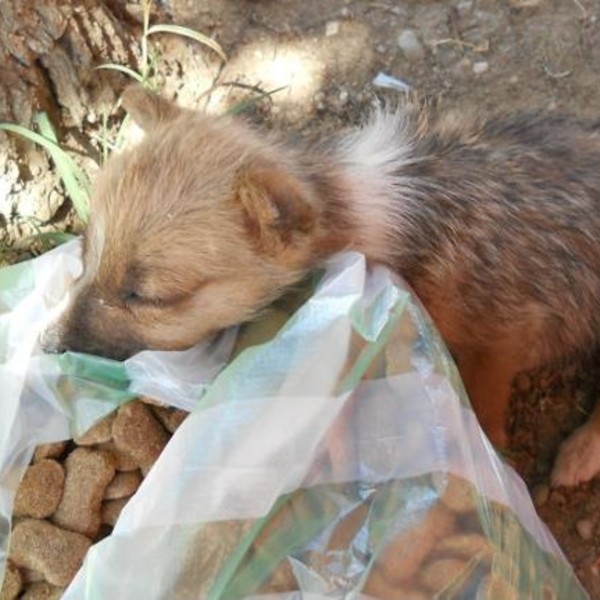
What ROLDA does to Help
ROLDA is adopting whenever possible from public shelters as life inside them is worse than in the wild. As often as we can, ROLDA takes dogs away from that nightmare into our shelter and search for a loving new home. Every year this number represents only 5-10% of dogs ROLDA rescue. It is essential that dogs are removed from this toxic atmosphere as soon as possible. The longer they spend in these awful places the longer they are exposed to violence and disease. The experience many dogs suffer in public shelters impacts them for life in the form of lifelong psychological scars. These dogs require much more time and resources to rehabilitate – it can cost thousands of pounds in specialist care – and some never recover to the degree they could be rehomed; many still remain in our care.
Please help ROLDA be a rare beacon of hope for Romanian’s 2.5 million homeless dogs!
Together, we have successfully transformed the life of dogs like:
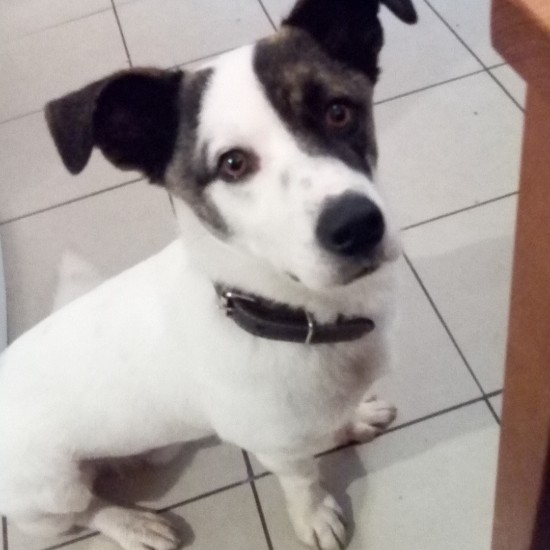
Flash (Adopted to the UK)
“I wasn’t really sure what to expect when we drove to collect Flash, having never previously adopted a dog from abroad, especially one rescued from a kill shelter. I had a vision of a dog that would probably be a bit subdued after such a long journey and would take time to adapt to his new life. When he was carried to the car from the van he looked exactly as I had imagined and I immediately thought he’s going to need some time to find himself, how wrong was I?
Flash settled into his new home faster than I could have imagined, from the minute he walked through the front door he has been an absolute pleasure to have around the house. He bonded very quickly with both of my housemates and I think it’s fair to say he’s already everyone’s favorite. It didn’t take him long to make himself at home and happy in his new life, he’s quickly found his feet here and you can see him growing in confidence every day.
Flash is such a little character, there have been too many little moments to recall already. He’s just as happy in his own company as he is with humans, he likes to sit in his little house when he wants some alone time but he’ll always pop out for a stroke. I’ve never met a dog who walks as well on a lead as Flash, from the first time we went walkies he’s been brilliant, walking a couple of paces behind he’s recently starting to lead the way when he knows where he is. He’s such a bright little chap, I can see he’s going to be a rewarding dog to train in the long term, his love of food will help with that. You can tell that food may have been hard to come by for Flash previously, he was very eager to eat what the humans are but again he’s quickly understanding that if he waits patiently he will be rewarded. He’s already leaned to sit and give his paw for treats. All in all, I couldn’t have wished for a more perfect little best friend, and I think Flash seems to enjoy his new life of sleeping on sofas, regular walkies, and endless tummy rubs. I was determined to give Flash the best life possible before I’d even met him, so I hope he’s ready for all the fun and excitement to come.
If you are thinking of adopting a dog I couldn’t recommend ROLDA more highly. From the first time I contacted them, they have been friendly and helpful. Sarah and Gemma have made the entire process easy and something that’s really shone through is just how much they care about the dogs that they help to rehome. They’re literally saving dogs like Flash’s lives and giving them new lives in loving homes”.
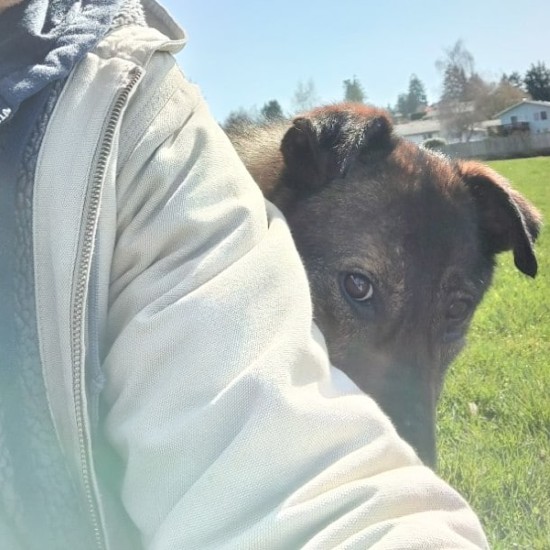
Tom (Adopted to the US)
“We adopted Tom from ROLDA in March 2021 and it was the best decision we could have made. I had travelled to Eastern Europe previously and fell in love with the street dogs and their independent, confident, yet lovable spirits. However, they are often neglected and have to fight for food or are abused by people who see them as a nuisance. Looking for a dog specifically from this area of the world proved to be a logistical nightmare until I found ROLDA. Dana worked with us to determine the type of dog we wanted and she was extremely responsive in regards to sending pictures and videos of Tom before we decided to take the chance. Everything was transparent and legitimate when it came to the adoption process.
Tom arrived at the local airport, very much a different dog than what he is now. At first, he was so scared to even come inside that we had to carry him inside. Over the course of the next few months, he began to come out of his shell. He has turned out to be a loyal, lovable, cuddly, sweet dog who loves to lay around and relax. He gets along well with other people and animals. Clearly, he appreciates a calm home where he can lay around and relax as much as possible.
We would 100% recommend that you adopt from ROLDA. Not only do you get a dog who needs a loving and reliable home but you also get a best friend who appreciates you and knows that you saved him from the streets. I have had many dogs over my life but Tom is something very, very special.”
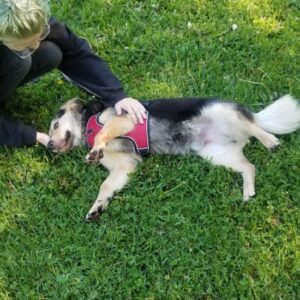
Pingu (Adopted to Canada)
“When we first met Pingu, we weren’t sure how much time he would need to trust us, since he had a rough past. Truth is, he gave us all the love he could right away. And it has never stopped since. During his time on the streets in Romania, he could have been beaten, hungry, cold, and had all of the reasons not to trust humans. But ever since he came into our lives, he does everything he can to make us smile, and he would do anything for scratches and treats. I won’t say it has always been easy; he came home with his fears and wounds. He was terribly scared of adult men and reacted loudly to any dog passing by. He was scared of bikes, loud cars, trucks, and buses. He refused to let the cat come near his food since he had always needed to protect it on the street. But not even two months later, here we are: he happily shares his food with the cat, he doesn’t bark as much at passing vehicles, nor men or dogs. He loves to explore everything and to cuddle up in the sun. He follows us everywhere in the house, and he’s already learning tricks. We still have work to do, to reassure him that he’ll never get hit again. Every time someone lifts their arm up, he curls up on the ground shaking. He’s still emotionally wounded, but we know that with love and patience, he’ll be able to overcome those fears.
Those ROLDA dogs, deserve the world! Pingu is the best dog we could ever have hoped for. He’s worth all the work and time, and we would take many more of his friends with us, just to know that they get all the love they deserve. But leaving those dogs on the street, and caging them in those pounds, you can’t even start to imagine how trauma that causes them. They all have the potential to be “your perfect dog”, just as much as those pure breeds. But for that, you need to give them a chance to reveal their personality, and that will be much harder if it is hidden behind all of the suffering public shelters put them through. Those dogs will challenge you. You will get to see their fears and their trauma through their eyes, and you will sometimes face a terrified, shaking, curled-up dog. You will face a dog that will be terrified of loneliness, and get into a panic attack every time you leave the house, fearing that they’ll get abandoned once again. You might also face big, loud, scary reactions which will only be calmed with patience and love and soft words in his ears. But through all of this, you’ll build a bond that you couldn’t even imagine. Pingu is the most faithful, protective companion I could’ve had. He protects me when someone sketchy tries to approach me, and he makes me appreciate all of the small moments I wouldn’t usually notice. I may get sleepless nights, but I’ve learned to look at the stars with him and love those calm cuddles while reassuring him. And after all of this, he does so much progress, just by knowing he is loved and safe. I’m so proud to see him get more and more comfortable. ROLDA dogs truly are rough diamonds.”
Click here to read more happy stories
Be a Hero for a Dog from Public Shelter!
Help us re-write their life stories!









